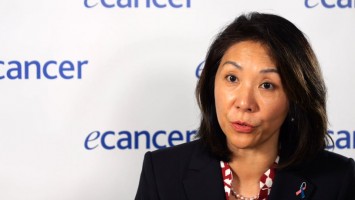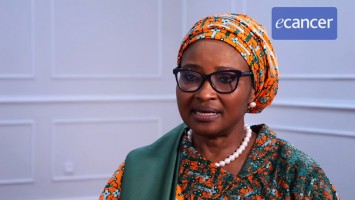The melanoma session had a few highlights.
The first part of the session was focussing on the new staging developments and potential improvements to the staging developments and also the need for surgery for sentinel node positive disease and the adjuvant treatment update on the nivolumab versus high dose ipilimumab data.
So a few key points from that that we found were that the addition of the lymph node dissection does not improve overall survival for patients with a sentinel node positive disease.
The new staging system works well if we externally validate that but the inclusion of sentinel tumour burden could potentially improve that staging system.
That all leads up to the fact that it was actually used already in a few large randomised phase III trials for adjuvant treatment as a threshold to include patients into those trials.
So what we have seen now with the update of the nivolumab data is that with an additional follow-up of six months the relapse free survival benefit is maintained so this is a good trend towards hopefully also leading to an overall survival benefit.
The first study that was presented on the staging was in a cohort of patients from Amsterdam where we externally validated the new edition to a set of 640 positive patients with stage 3 disease.
We found that the systems work well, both the 7th and the 8th edition. What we do see is that the addition of sentinel tumour burden to the 8th edition does improve the discriminatory value of stage 3a patients.
And then?
The second study presented was the DeCOG-SLT study which is a randomised study from Germany which randomises patients who have a positive sentinel node towards either a complete lymph node dissection immediately or nodal observation.
The study was already presented at ASCO a few years ago but now they presented follow-up data with more years of follow-up and it still remains the same that there is no improvement in overall survival by doing early completion lymph dissection.
It’s good to know that at least nothing has changed in that regard.
I imagine it might have been surprising if it had.
It would have been surprising so that’s what’s also very important always is still to see what we have seen before is confirmed with long-term follow-up.
And then the new data from nivolumab and ipilimumab – what’s that?
Yes.
The new data is on the CheckMate-238 study which is a randomised study of more than 400 patients in both arms either towards adjuvant nivolumab after resected stage 3b, 3c, or stage 4 melanoma versus high dose ipilimumab.
We already know that high dose ipilimumab has an overall survival benefit because it was previously shown in the EORTC study comparing that to placebo that it had overall survival benefit.
Obviously with new anti-PD1 treatments we would expect even more benefit and less toxicity.
That was already seen in the first early report of the study and is now again confirmed with more follow-up.
And when it comes to lessons to take away to put into clinical practice from the sessions today, or whenever they were, I’m losing track of time personally?
What does that mean for people working with these stage 3, stage 3b patients that you’ve mentioned?
These studies have been practice-changing I suppose because they will influence how we treat sentinel node positive patients.
That was also a big part of the discussion after the presentations.
So the management will shift from the longer performing complete lymph node dissection towards treating patients with adjuvant therapy.
First line will be adjuvant anti-PD1 therapy and that will be for sentinel node positive disease with the threshold of 1mm or more.








